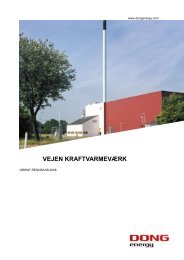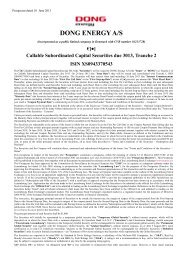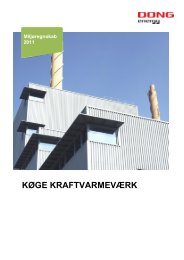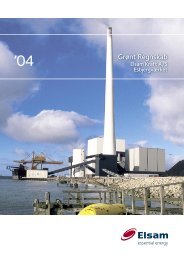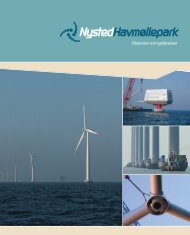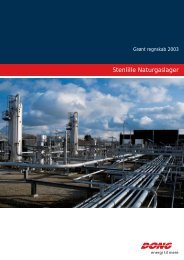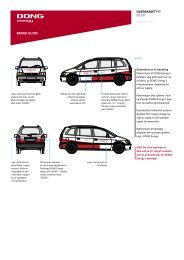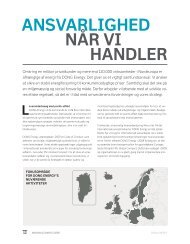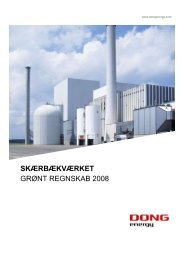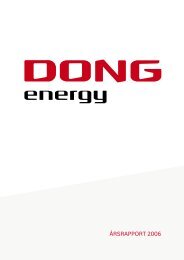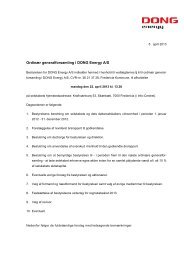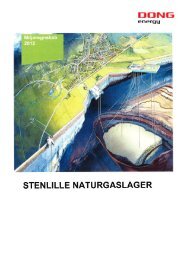ANNUAL REPORT 2011 - DONG Energy
ANNUAL REPORT 2011 - DONG Energy
ANNUAL REPORT 2011 - DONG Energy
You also want an ePaper? Increase the reach of your titles
YUMPU automatically turns print PDFs into web optimized ePapers that Google loves.
MaRket CONDITIONS<br />
<strong>Energy</strong> markets are affected by the economic climate, political priorities<br />
and natural phenomena<br />
<strong>2011</strong> started on an optimistic note, with signs of improvements<br />
in the European economies following the financial<br />
and economic crises that struck Europe from mid-2008.<br />
Over the summer and autumn, the optimism was replaced<br />
by economic uncertainty in the shape of the debt<br />
crisis in Europe, large government budget deficits, the<br />
weakening of the euro against the US dollar, limited economic<br />
growth and the resulting lower demand for energy.<br />
At the same time, the challenges in relation to global<br />
warming remain high on the political agenda. However,<br />
this has not had any visible effect on the pricing of CO2 emissions allowances, as efforts to achieve global endorsement<br />
of targets for reducing CO emissions have yet<br />
2<br />
to succeed. Since summer <strong>2011</strong>, it has become more likely<br />
that there will be an oversupply of CO emissions allow-<br />
2<br />
ances in Europe, and the prices of allowances were at the<br />
lowest level to date at the end of <strong>2011</strong>.<br />
In Europe, there is still the will to support green investments.<br />
In both the UK and Germany, initiatives were undertaken<br />
in <strong>2011</strong> to strengthen renewable energy.<br />
The European energy sector faces large investments in<br />
renewable energy and infrastructure. However, access to<br />
capital has become more difficult as a consequence of the<br />
debt crisis and the beleaguered financial sector. As an alter-<br />
Biomass must be sustainable<br />
Coal is on the way out of <strong>DONG</strong> <strong>Energy</strong>’s power stations.<br />
The plan is for wood pellets, in particular, to replace coal.<br />
Wood pellets can be produced in several different ways.<br />
If they are produced sustainably, they reduce CO 2 emissions<br />
without harming biodiversity. To ensure a sustainable<br />
production of wood pellets, <strong>DONG</strong> <strong>Energy</strong> will make<br />
further requirements of wood pellet producers.<br />
There are currently no general standards for sustainability<br />
in relation to solid biomass. Therefore, <strong>DONG</strong> <strong>Energy</strong> has<br />
worked with other European energy companies to draw up<br />
sustainability criteria for the production of wood pellets.<br />
The criteria are designed to ensure that the wood pellets<br />
8<br />
manaGEmEnt’s rEviEw – <strong>DONG</strong> ENERGY GROUP <strong>ANNUAL</strong> <strong>ANNUAL</strong> <strong>REPORT</strong> <strong>REPORT</strong> <strong>2011</strong> <strong>2011</strong><br />
native, other sources are therefore increasingly being used,<br />
such as pension funds and other institutional investors.<br />
The prices of oil and gas fell sharply in 2008-09 in the<br />
wake of the financial and economic crises. There was no<br />
corresponding trend in <strong>2011</strong>, when oil and gas prices remained<br />
at a higher level (USD 111/bbl on average in <strong>2011</strong><br />
against USD 62/bbl in 2009 for oil and EUR 23/MWh<br />
against EUR 12/MWh for gas). The wider spread between<br />
oil and gas prices, with relatively higher oil prices (decoupling),<br />
which arose in spring 2009, continues to prevail.<br />
The accident at the Fukushima nuclear power station in<br />
connection with the earthquake in Japan in March <strong>2011</strong> led<br />
to a change in the approach to nuclear power in several<br />
countries. In Germany, several older nuclear power stations<br />
were immediately shut down and a decision was<br />
taken to phase out the remaining stations faster than<br />
originally planned.<br />
Despite this, there is still surplus capacity for the<br />
generation of electricity in Europe, and demand is lower<br />
than before the financial crisis. The surplus capacity is not<br />
expected to be reduced until a number of the most polluting<br />
coal-fired power stations in Europe are phased out in<br />
the coming 3-8 years.<br />
that <strong>DONG</strong> <strong>Energy</strong> uses continue to reduce CO 2 emissions<br />
and preserve biodiversity.<br />
“With wood pellets, Danish power stations can deliver<br />
green electricity and heat to supplement the more variable<br />
wind energy. I hope that the European authorities will be<br />
inspired by the criteria that <strong>DONG</strong> <strong>Energy</strong> and our partners<br />
have established and will develop pan-European standards<br />
for sustainability for biomass. That would enable us to talk<br />
to the producers of wood pellets with even greater conviction<br />
so we can ensure that the wood pellets we use in Europe<br />
continue to be sustainable,” says Thomas Dalsgaard,<br />
Executive Vice President of Thermal Power.



